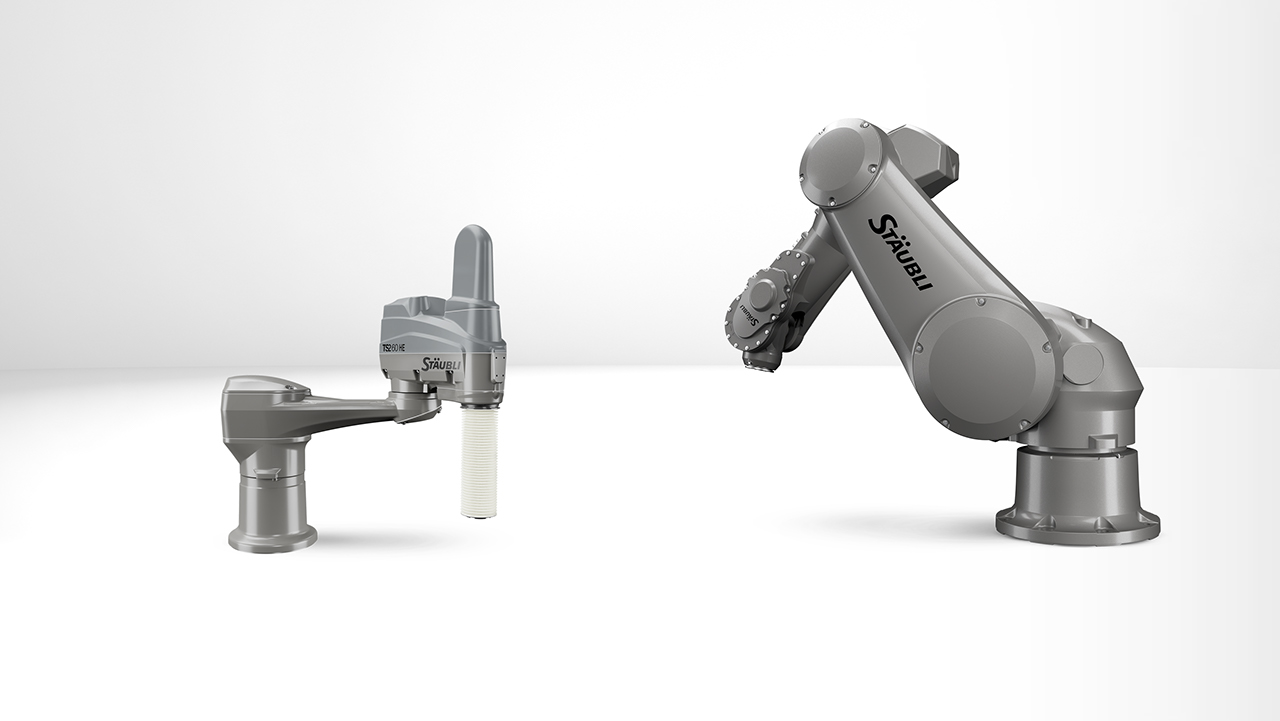SUCCESS STORY
Hygienic automated hard cheese production
In hard cheese production at BMI (Bayerische Milchindustrie eG) in Jessen, Germany, two robotic cells ensure hygienic primary packaging of freshly produced cheese blocks. Read how reliable, economically flexible and sustainable the packaging of 35,000 tons of hard cheese a year can be with the use of robots.
CUSTOMER BENEFITS
- Safe compliance with the strictest hygiene standards
- High output
- Washdown-compatible robots
- Maximum flexibility
- Minimal space requirements
TASK
Primary packaging of 100 tons of block cheese daily
Bayerische Milchindustrie (BMI) produces around 35,000 tons of hard cheese a year at its Jessen site in Germany. This requires processing approximately 350 million liters of milk from some 35,000 cows. Two robotic cells take over primary packaging of the freshly produced cheese blocks under the strictest hygiene standards.
This makes this production site not only the largest cheese factory in the BMI group, but also a major producer throughout Germany, especially since its product diversity is broad and its production is highly flexible: BMI produces Cagliata, white and red cheddar, Edam and Emmental among others in Jessen. A large portion of these products go to industrial customers, but they also go to retail chains for end consumers under the Paladin brand or private labels.
Between 2017 to 2019, the company invested the impressive sum of more than €100 million, including investment in a new hard cheese factory to produce these volumes and varieties economically with consistently high quality. The entire plant runs 20/7, as Thomas Benicke, production manager at the hard cheese factory explains, “We produce for 20 hours. Then the entire plant stops, gets cleaned, and a new production cycle begins.”
SOLUTION
Primary packaging of cheese blocks in two robotic cells
This pace also applies to the final stage, namely packaging. When the cheese leaves the drainage belt, it enters one of six TetraPak Casomatic SC7 systems via a pipeline. These systems continuously and fully automatically handle pre-pressing, forming cheese blocks, and filling. The end product is cheese blocks weighing precisely 15 or 20 kg, ready for packaging.
BMI commissioned Lemmermeyer Edelstahl-Anlagenbau in Deiningen, Germany to design the primary packaging line. Three of the six TetraPak columns are assigned to a robotic cell with a Stäubli six-axis TX200L robot in HE design. With a load capacity of 100 kg and reach of 2.60 meters, the robots are optimally prepared to handle the cheese blocks, and thanks to the gripper developed by Lemmermeyer, also have multitasking capability.
The base-mounted robot first grips a film tube and pulls it over the film shoe of the filling column. The system then pushes the 15- or 20-kg block of cheese into the tube, or two blocks of cheese if 40-kg units are being produced. The robot places the prepackaged cheese on a two-track pre-buffer conveyor belt, forming batches of 4 x 15 kg or 4 x 20 kg, or 2 x 40 kg. The batches are aligned and prepared for vacuuming and sealing. The following steps then take place: metal detection, labeling and leakage testing before the blocks are conveyed to the ripening area.
- teaser
- teaser
- teaser
- teaser
- teaser
- teaser
CUSTOMER USAGE
Flexible and hygienically automated
The two robots perform their tasks with great endurance and a remarkable packing capacity of up to 5.5 tons per hour. Despite the high throughput, the systems are extremely flexible. For example, the division into two identical cells ensures that production and packaging can still be performed even if one of the two cells is at a standstill.
However, the main reason BMI invested in flexible automation was the high hygiene standard. Thomas Benicke: "As a cheese factory whose core production processes are prompted by bacteria, we must avoid the risk of introducing contamination at all costs. This is best achieved when humans do not intervene."
That said, people do come into contact with the robots once a day during thorough lathering in cleaning mode. After just one process like this, a "normal" robot would hardly be operational. But Stäubli HE robots are prepared for this from base to wrist. As a result, they handle around 100 tons of block cheese per day as "sole workers" in their cell with a cycle time of 10 seconds – reliably, durably and enduringly.
